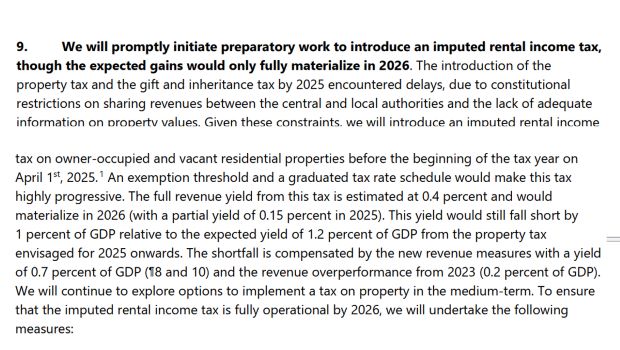COLOMBO – Sri Lanka’s opposition has questioned claims made by government spokesmen that a tax on housing proposed in an International Monetary Fund (IMF) deal is only limited to rich people. The claims echo a promise made by President Ranil Wickremesinghe in Parliament that the first house of a citizen will be excluded from the property tax.
However, opposition legislator Harsha de Silva pointed out that the IMF program documents clearly say taxes will be levied on owner-occupied houses on ‘imputed taxes’, not second houses.
Under the current Inland Revenue laws, actual rent income from a second house is already captured as part of taxable income.
The IMF document mentions a threshold value from which taxes will be exempt but not that a whole owner-occupied primary residence will be exempt.
“The tax is imposed on the income of individuals (rather than real property itself) and thus raises central government revenue in accordance with the Constitution,” IMF staff said in its report.
It said a similar tax was previously included in the Inland Revenue Act. No. 10 of 2006, under which regime, primary residences were exempt and the assessed values for rating purposes were used to determine the base.
It noted that given the broad exemption and the use of outdated and downward-biased annual values, the tax generated hardly any revenue.
Meanwhile Sri Lanka, in its memorandum of economic policies agreed with the IMF has promised to impose the housing tax from April 1, 2025, stating, “…[W]e will introduce an imputed rental income tax on owner-occupied and vacant residential properties before the beginning of the tax year on April 1st, 2025.”
The memorandum also states that an exemption threshold and a graduated tax rate schedule would make the tax highly progressive and the estimated full revenue yield set at 0.4% d would materialize in 2026 (with a partial yield of 0.15% in 2025).
It also states the yield would still fall short by 1% of GDP relative to the expected yield of 1.2% of GDP from the property tax envisaged for 2025 onwards.
De Silva told in Parliament irrespective of the President said the IMF agreement states owner-occupied house, pointing out, “It is not the second house that is mentioned in the agreement”.
He also noted that the Samagi Jana Balawegaya had been able to save the middle class in society from a massive tax that was to be imposed.
Critics note that in Sri Lanka there is a belief the most productive citizens are fair game for excessive or expropriationary taxation, just like kulaks were targeted in the Soviet Union for actual expropriation.
Wealth taxes have had disastrous effects on some US cities like Baltimore, leading to falling populations and dilapidated houses.
Sri Lanka is currently facing a brain drain due to high-income tax on top of depreciation from severe monetary debasement from a flexible exchange rate, which is neither a hard peg nor a clean float.
Sri Lanka has imposed a wide range of taxes on the people to maintain a bloated state, after inflationists engaged in extreme macro-economic policy (tax and rate cuts) glorified in Saltwater-Cambridge doctrine to boost growth, throwing classical economic principles and monetary stability to the winds and driving the country into external default.
The IMF itself gave technical assistance to the central bank to calculate potential output inviting the agency to cut rates to close the perceived econometric ‘output gap’.
In the run-up to the default, rate cuts triggered multiple external crises, leading to output shocks as stabilization programs were implemented.
-economynext.com



Comments are closed, but trackbacks and pingbacks are open.